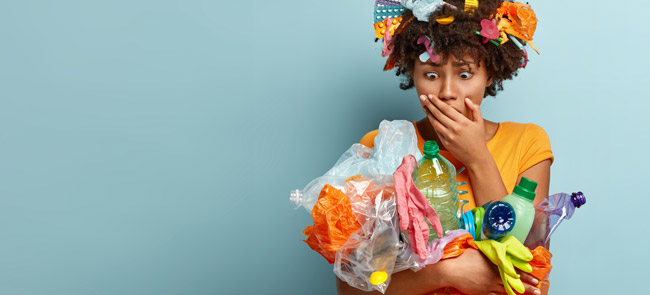How to Use Less Plastic

How do you reduce plastic use when everything that we buy today comes in some sort of plastic packaging? While this might seem like a difficult endeavour, it is not impossible. In fact, it can be achieved quite easily. All it takes is a little bit of awareness and a few lifestyle changes.
“Well, what about recycling? Isn’t that good enough?” – you might ask.
Recycling is great and you should definitely do it. However, an even greater impact can be achieved if we reduce the use of plastic. This is because there are lots of problems related to recycling plastics. For example, most of it is actually non-recyclable with the current technologies that we have in the UK and all over the world. Thus, the majority of plastic ends up in the ocean and landfills.
So, if you are somebody who:
- Cares about the environment and future generations;
- Wants to use less plastic in order to join the global movement;
- Understands that plastic pollution is a serious problem;
- Is willing to make small lifestyle changes for the greater good,
Then here we will share with you several actionable strategies that you can try in order to reduce plastic use.
How to stop plastic pollution through smarter grocery shopping
The bulk of plastic use comes from grocery shopping, so this is where we start in order to stop plastic pollution. Consider this: can you buy a version of a food/household product that does not come in plastic packaging?
Here are some good examples:
- Carton of milk/fruit juice instead of a plastic bottle.
- Fresh veggies and fruits instead of packaged ones.
- Bulk food shopping vs. small plastic packages.
- Eggs in a carton instead of plastic.
- Ice-cream cone vs. plastic packaging.
- Paper shopping bags over plastic (or bring your own).
- Toilet paper in paper packaging vs plastic.
- Laundry detergent in boxes, not liquid in plastic containers.
The rule is simple: If possible, go for paper, metal, and glass packing over plastic.
Or non-packaging at all. Just look around your local supermarket’s aisles and consider your options. With food and product manufacturers becoming more and more sustainable, there are plenty of nature-friendly options that do not include plastic. Just take the time to explore and make the plastic-free choice.
Reduce plastic through lifestyle changes
Now let’s take a look at ways to reduce plastic use and, in some cases, completely eliminate it from our lives. Here are some simple lifestyle changes that everyone can do.
1. Say goodbye to bottled water
Water in plastic bottles is a no brainer, really. When it comes to your household, simply opt for a filtrating jug. It will significantly reduce the plastic coming out of your home, and it is way cheaper to buy a new filter every 2 to 3 months than buying gallons of water on a weekly basis.
Also, bottled water might not be good for our health, as researchers have found that it often contains microplastics that end up in our bodies.
2. Say no to plastic food containers and utensils
Hey, who doesn’t love takeaway?
Well, the answer is nature.
This is because some of our favourite meals often come in plastic packaging that is non-recyclable. Luckily, there is an easy solution to this when you go to pick up the food yourself. Just call your favourite restaurants beforehand and tell them that you will be bringing your own reusable food containers where they can place the meals.
Also, make sure to refuse any plastic utensils. You can also bring a food container when you go to a restaurant, in case you can’t finish your meal and would like to take it home.
3. Opt for wooden versions of everyday/household items and accessories
Nowadays, you can find a wooden version of pretty much anything. Here are a few great examples:
- Toothbrushes
- Hairbrushes and combs
- Ear swabs
- Single-use utensils
- Umbrellas
- Sunglasses
- Wristwatches
- Cutting boards
- Pegs
- Toys
Of course, if you already own a plastic version of a product, keep using it as much as possible. However, when the time comes to purchase a brand new one, be aware that there probably is a wooden alternative out there.
4. Go for plastic-free or old-school razors
Ouch. Okay, we know this one might be a bit hard to accept. But consider this – modern razors are not sustainable. They are expensive, too. Instead, you can go for one of those old-timey razors with changeable heads.
Waxing has a more lasting effect, too, but if that is your thing, then make sure to opt for a plastic-free method. A popular homemade option is done with a mixture of honey, sugar, and lemon, and using paper cloths. The first few sessions might be a little painful but people usually get used to it quite fast. Just give it a try if you feel comfortable doing it. Who knows, you might actually find out that you prefer it.
5. Opt for plastic-free skincare products and cosmetics
Forget about the plastic bottles and packaging for a sec. Did you know some cosmetic products actually have plastic ingredients in them? Do your best to purchase plastic-free cosmetics.
6. Buy second-hand clothing and/or choose natural fabrics
There are many problems related to fast fashion. And pollution is one of them. Many brands are doing their best to introduce sustainable practices, but still.
On the other hand, there are plenty of clothes that are cheaper and just as good found in second-hand stores. And if you have to buy new clothes, make sure to read the labels and opt for natural fabrics.
7. Non-plastic packaging for shampoo and soap
There are soap bars in paper packaging. But did you know that there is dry shampoo that comes in paper packaging as well? The switch might need some getting used to at first but it is all for the greater good.
8. Bring your own cup/mason jar to coffee shops
At this point, you might be thinking that you need to carry a bag at all times for all your eco-friendly utilities. But plastic has already reached our tap water. We are already at a critical point. That cup of coffee you get is just one of the millions that are being used once.
9. Do not use air fresheners. Light a candle or incense instead.
Seriously, how come air fresheners are still around? Is there anyone who enjoys a breath of fresh chemicals that burn their throat and nose? Just say goodbye to these toxic products.
There are plenty of ways to create the atmosphere you desire through amazing smells. You can resort to aromatic candles or explore the vast world of essential oils.
10. Support your local farmers market
You can find so many goodies produced by local farmers that taste amazing there. Plus, it is a great way to support your local community during these difficult times. Just make sure to bring your food containers, just in case.
Reduce plastic use by giving up these things forever
- Bin bags
At this point, saving the world has a lot to do with giving up some conveniences. Sure, it’s a pain not to use them at first. But we are causing a world of hurt when we do. - Cigarettes
Smoking kills people. And the planet. Those cigarette butts are even worse than plastic straws! They end up in the ocean and fish eat them. The same is later served on a plate. - Chewing gum
If you love to exercise your jaw with chewing gum, we have some bad news for you. Most of the commercially available chewing gum contains plastic. If you can’t go without chewing, opt for products that are specifically labelled to be free of plastics. - Plastic wrap
Plastic wrap is too thin to be recycled. Your best option is to have plenty of reusable food containers. Also, beeswax food wrap is becoming more and more popular, so you can try that as well.
Takeaways
- Reducing plastic use is more impactful than recycling it.
- Every household can reduce their plastic use through smarter shopping and simple lifestyle changes.
- It takes a little getting used to, but giving up some minor conveniences can have a meaningful impact.
- Find out more about our sustainable policy here.
Image source: Shutterstock / WAYHOME studio




